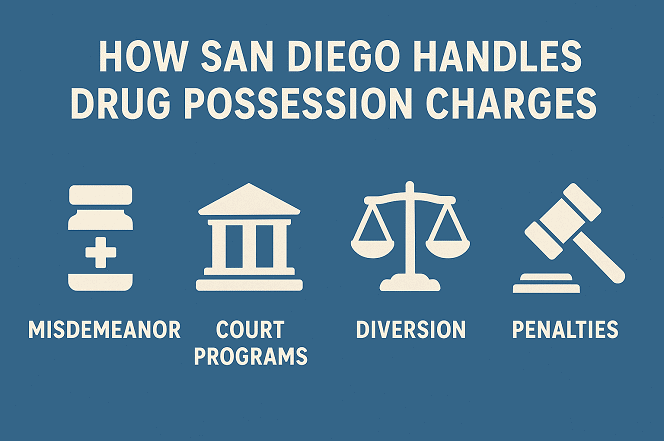
Drug possession charges in San Diego carry serious legal consequences and can have long-term effects on an individual’s personal and professional life. Understanding how these charges are handled under California law is essential for anyone facing accusations, as well as for family members who want to provide support. San Diego’s legal system approaches drug possession cases with a mix of strict enforcement and opportunities for rehabilitation, depending on the circumstances of the case. If you’re facing these accusations, consulting an experienced Criminal Defense Lawyer San Diego is crucial.
California law distinguishes between two main types of drug possession: simple possession and possession for sale.
San Diego courts operate under California’s Health and Safety Code, which defines the penalties for each type of possession. While simple possession may be classified as a misdemeanor in many cases, possession for sale is almost always a felony. Working with a Drug Possession Attorney San Diego can help determine the best defense strategy for your case.
The severity of penalties for drug possession depends on several factors, including the type of drug, quantity, prior criminal record, and whether the offense involved aggravating circumstances.
In addition to legal penalties, drug possession charges can affect employment, housing opportunities, professional licenses, and immigration status. For the best outcome, having a San Diego Drug Possession Lawyer can make a major difference in court proceedings.
Proposition 47, passed by California voters in 2014, significantly changed the way San Diego courts handle drug possession. Under this law, many non-violent drug possession offenses were reclassified from felonies to misdemeanors. This provided an opportunity for individuals to avoid lengthy prison terms and instead receive alternative sentences such as probation, drug treatment, or community service.
For those previously convicted under harsher penalties, Prop 47 also opened the door to petition for reduced charges and lighter sentences. A skilled Criminal Attorney San Diego can guide you through the process of seeking reduced charges.
San Diego courts recognize that drug possession often stems from substance abuse issues. To address this, several diversion programs are available:
These programs provide alternatives to traditional penalties, allowing individuals to focus on rehabilitation while reducing recidivism rates in San Diego.
Defense strategies vary depending on the specifics of the case. Common defenses include:
A knowledgeable Criminal Lawyer San Diego will evaluate these defenses and build the strongest possible case.
Drug possession charges can be complex, especially when multiple factors—such as prior convictions or intent to distribute—come into play. Navigating the San Diego court system without legal expertise increases the risk of harsher penalties. An experienced criminal defense attorney can analyze the evidence, negotiate plea deals, and help secure access to diversion programs or reduced charges.
A conviction for drug possession in San Diego extends beyond immediate penalties. Potential long-term effects include:
For these reasons, handling drug possession charges with caution and securing proper legal guidance is critical.
San Diego takes drug possession charges seriously but also provides pathways for rehabilitation and second chances. With Proposition 47, diversion programs, and opportunities for treatment, the legal system aims to balance accountability with support for recovery. Still, the consequences of a conviction can be severe, making strong legal representation essential.
No. Thanks to Proposition 47, many drug possession charges are classified as misdemeanors. However, possession for sale and cases involving large amounts of drugs are usually treated as felonies.
Yes. First-time offenders may qualify for diversion programs such as PC 1000, Drug Court, or Proposition 36, which focus on treatment instead of incarceration.
Possessing prescription drugs without valid documentation can still result in criminal charges. However, showing evidence of a lawful prescription can serve as a defense.
In many cases, yes. After successfully completing probation and meeting court requirements, individuals may apply for expungement to clear their criminal record.
The most important step is to remain calm and avoid self-incrimination. Contacting a qualified criminal defense attorney as soon as possible ensures the strongest defense strategy.